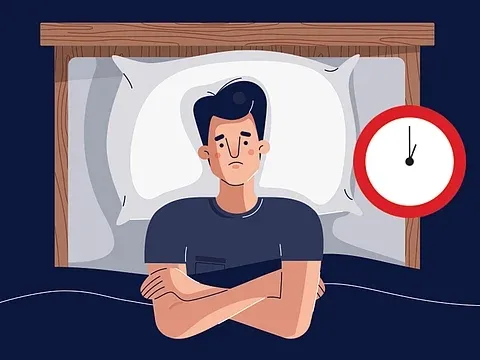Why Staying Up Past Midnight Could Be Dangerous, According to the “Mind After Midnight” Theory
Why sleep deprivation affects your decision-making How circadian rhythm impacts mental health The neuroscience of insomnia explained Late-night anxiety: what happens to your brain after midnight Andrew Tubbs “Mind After Midnight” research summary How to reset your sleep schedule naturally

By YEET Magazine Staff, YEET Magazine
Published October 19, 2025
Why Staying Up Past Midnight Could Be Dangerous, According to the “Mind After Midnight” Theory
Scientists are warning that humans aren’t built to be awake after midnight — and that pushing past that biological boundary may carry serious mental and emotional consequences.
The idea, known as the “Mind After Midnight” hypothesis, suggests that our brains enter a different mode late at night — one that heightens impulsivity, intensifies negative emotions, and increases the risk of depression, addiction, and even self-harm.
“After midnight, our biology changes,” explains researcher Andrew S. Tubbs, co-author of the 2022 paper published in Frontiers in Network Physiology. “The brain is less capable of rational decision-making and more vulnerable to emotional and behavioral dysregulation.”
What Happens to the Brain After Midnight
During daylight hours, the human brain is primed for focus, communication, and reason. But once the clock strikes midnight, the balance shifts.
Our circadian rhythm — the internal clock that governs sleep and alertness — cues the body to rest. Staying awake fights that natural process, leading to distorted thinking and reduced impulse control.
The research points to a measurable pattern:
- Higher risk-taking behavior after midnight
- Increased negative thinking and emotional instability
- Greater likelihood of acting on harmful impulses
From an evolutionary perspective, the shift makes sense. Humans evolved to be active in daylight and rest when darkness made survival riskier. But in a modern, always-connected world, this ancient wiring can turn against us.
The Hidden Risks of Late-Night Wakefulness
The researchers cite troubling examples. A person who easily avoids drugs or alcohol during the day may relapse at night. A student struggling with insomnia might fall into despair during the quiet hours when help is hardest to reach.
The data is striking: suicide rates are highest between midnight and 6 a.m., and nighttime overdoses are significantly more frequent. These trends suggest that post-midnight wakefulness isn’t just a symptom of distress — it can be a risk factor itself.
Why It Matters for Mental Health
Experts argue that health systems and workplaces should start viewing chronic late-night wakefulness as a mental health warning sign.
Much like sleep deprivation impairs driving or cognitive function, post-midnight wakefulness may alter brain chemistry in ways that fuel anxiety, hopelessness, and reckless behavior.
“Nighttime thinking isn’t the same as daytime thinking,” Tubbs said. “When you’re awake after midnight, you’re not operating with your full cognitive capacity. That’s when bad decisions happen.”
Final Thoughts
The Mind After Midnight hypothesis challenges the cultural idea that “night owls” simply have a different lifestyle. Instead, it suggests that staying up late may carry measurable psychological costs — and that respecting our natural circadian limits could be a simple but powerful step toward better mental health.
As researchers continue to explore the connection between nocturnal wakefulness and emotional regulation, one takeaway is clear:
Sometimes, the smartest thing you can do for your mind is to go to sleep.
Tags :Mind After Midnight hypothesis, Andrew S. Tubbs, sleep deprivation mental health, brain function after midnight, circadian rhythm research, night-time risk behavior, sleep and depression, why staying up late is bad for you, nocturnal wakefulness study, late-night anxiety, suicide risk after midnight, emotional regulation sleep cycle, human body clock, insomnia research, nighttime decision-making, sleep and impulse control
Related Posts
Why sleep deprivation affects your decision-making
How circadian rhythm impacts mental health
The neuroscience of insomnia explained
Late-night anxiety: what happens to your brain after midnight
Andrew Tubbs “Mind After Midnight” research summary
How to reset your sleep schedule naturally
The link between night-time wakefulness and depression
Why late-night scrolling worsens mental health
Understanding sleep and emotional regulation
Why your brain makes bad decisions after midnight
Circadian rhythm and the psychology of risk-taking
How modern lifestyles disrupt the human sleep cycle
Sleep science: what your brain does at night
The biological limits of human wakefulness
Why working night shifts affects mood and focus
Sleep hygiene tips for better mental health
The science behind post-midnight impulsivity
Nocturnal brain function and behavioral changes
Sleep researchers warn about “night-time thinking”
Why suicide risk increases at night
How technology keeps your brain awake after midnight
The dangers of all-nighters for students
Why humans evolved to rest in darkness
Frontiers in Network Physiology “Mind After Midnight” study summary
How to protect your mental health with better sleep
Sleep deprivation and emotional regulation research
Why night-time solitude fuels overthinking
How to recognize sleep-driven emotional shifts
The link between circadian disruption and addiction
Why rest is essential for rational thinking
Sleep, mood, and mental health connection explained
Understanding late-night decision bias
Why night owls may be at higher psychological risk
What scientists say about the “Mind After Midnight” theory
The truth about sleep, mood swings, and impulsivity
Late-night brain chemistry: dopamine, cortisol, and risk
How to recover from chronic sleep deprivation
Why we make worse decisions at night
The neuroscience of staying awake too long
How to avoid emotional spirals after midnight
Why “night thoughts” feel more intense than day thoughts
Mental health experts warn about post-midnight wakefulness
